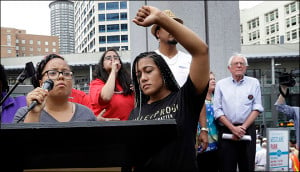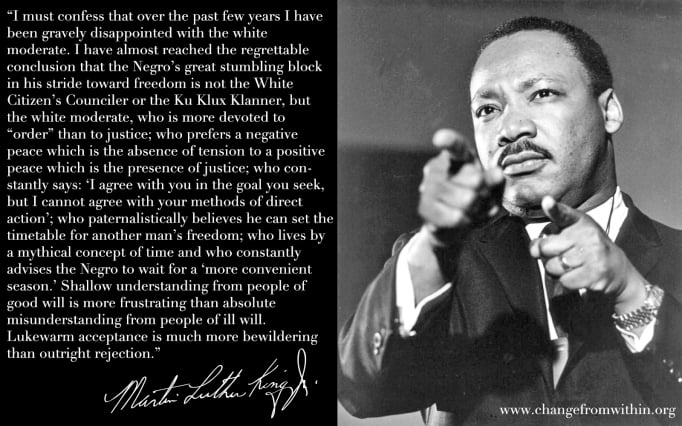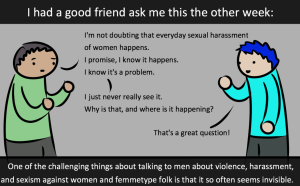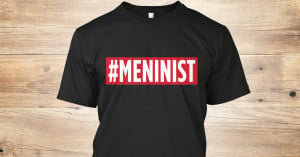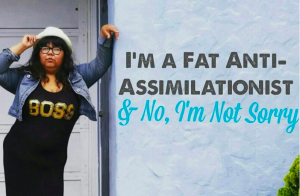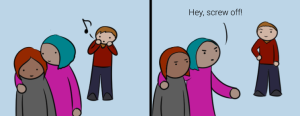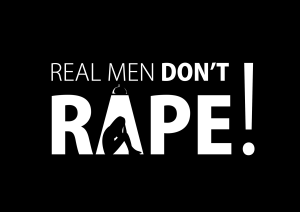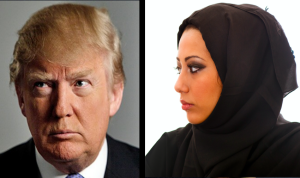Originally published on Change from Within and cross-posted here with their permission.
You know, I’ve always liked Bernie Sanders. I appreciate that as a US Senator, he ‘s been willing to speak the truth about many important social issues.
But he’s also a US Senator, which means that he is only going to be as progressive as his electorate allows him to be.
That said, I’d generally been pretty disappointed with the lack of racial justice analysis in his economic inequality platform as a candidate for president. That is, until a few weeks ago when some phenomenal Black activists at the Netroots Nation Presidential Town Hall forced his hand.
For all of the “this is not the way” sentiment we’re hearing from White progressives, it was the interruption at Netroots (alongside other direct pressure) that led to Bernie’s explicit platform on racial justice.
Notably, Black Lives Matter activists haven’t been successful (though I am sure not for lack of trying) in interrupting Hillary Clinton in the same way (that secret service protection and massive campaign budget for private security sure is handy), but even she has had little choice but to pay attention to Black Lives Matter as a movement.
And there is a great deal of disagreement within Black communities (we as White folks would do well to remember that people and Black organizations aren’t monoliths) about whether the action was strategic and whether targeting Bernie was the right move. And that dialogue should continue to take place within Black liberation spaces. But White folks, that’s not our business.
Because here’s the thing: What’s powerful about these interruptions from Black women is less how it has changed the tone of the Democratic campaigns and more about what they have exposed in the White left.
I see these protests as less about the individual candidates themselves and more about how their White base refuses to center Black lives and Black issues. It’s notable that White Bernie supporters, who consider themselves the most progressive of us all, shouted down and booed Black women who dared to force Blackness into the center of White space.
Because let’s be honest, every Bernie rally is White space.
In watching the over-the-top angry response from White liberals about Bernie being interrupted in Seattle, I can’t help but think of the words of Rev. Dr. Martin Luther King, Jr. on White moderates:
What was true in King’s time is true in ours: The greatest stumbling block to racial justice is not the KKK; it’s well-meaning White people who would rather maintain injustice than risk the decentering of our Whiteness and White comfort.
And when I watch and hear the reaction of a mostly White Seattle crowd to a Black woman naming that the event is taking place in the context of Indigenous genocide, the new Jim Crow, and the everyday violence that Black, Brown, and Indigenous people face in Seattle, I’m ashamed.
Two Black women called for a moment of silence for Mike Brown a year after he was gunned down, left bleeding in the street for four-and-a-half hours, and White “progressives” shouted, booed, and chanted the name of a White man throughout that moment.
How much more committed to a “negative peace” can we get than literally shouting down the memory of a Black youth whose murder helped to spark this movement?
And how much more “devoted to ‘order’” can we be than to lecture Black people about what direct actions are and are not “hurting your cause?”
(Notably, this language I’ve seen from countless White folks shows that we do not see the cause of racial justice as our cause – it’s that cause over there that we will tolerate so long as it doesn’t disrupt our Bernie rally.)
And how much more of a “stumbling block” can our self-proclaimed “allyship” be to racial justice when it’s so feeble as to proclaim, “I am a strong ally of the Black Lives Matter movement, but I’m not sure how to be an ally when they are this disrespectful to the only candidate that has actually done anything for minorities?” (And yes, that’s an actual quote from one of the 15 or so social media threads I’m following as I write this article.)
Notably, it wasn’t two Black women who kept Bernie from speaking in Seattle. It was a White man, a Bernie supporter, who organized the event who shut it down, said the event was over, and informed the crowd that Sanders would not be speaking because he couldn’t agree with the “methods of direct action” of the Black women in front of him.
We are so resistant to the decentering of Whiteness and the centering of Blackness that we cut off our own nose to spite our face.
White solidarity toward racial justice must look like more than pointing to the fact that Bernie Sanders was a supporter of Civil Rights in the 60s.
White solidarity toward racial justice must look like more than a Facebook share of a Ta-Nehisi Coates article (don’t get me wrong, I love Coates).
White solidarity toward racial justice must even look like more than showing up to the occasional rally that is organized and led by people of Color (though this is a good start – please show up).
White solidarity begins with our willingness to decenter ourselves and to divest from Whiteness, our privileges and power, and to support the centering of progressive leadership of Color.
White solidarity continues when we work with our own people to dismantle the deep-seated White supremacy that would cause us to boo during a moment of silence for a Black boy murdered by a White police officer.
[do_widget id=’text-101′]
Jamie Utt is the Founder and Director of Education at CivilSchools, a comprehensive bullying prevention program, a diversity and inclusion consultant, and sexual violence prevention educator based in Tucson, AZ. He is currently working toward his PhD in Teaching, Learning, and Sociocultural Studies at the University of Arizona with research interests in the role that White teacher’s racial identity plays in their teaching practice. Learn more about his work at his website here and follow him on Twitter @utt_jamie. Read his articles here and book him for speaking engagements.
Search our 3000+ articles!
Read our articles about:
Our online racial justice training
Used by hundreds of universities, non-profits, and businesses.
Click to learn more


